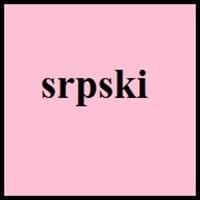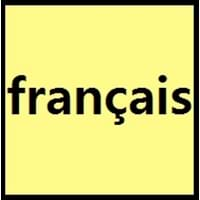Countries
Bosnia and Herzegovina, Kosovo, Serbia, Slovakia
Belgium, Benin, Burkina Faso, Burundi, Cameroon, Canada, Central African Republic, Chad, Comoros, Congo, Cote d'Ivoire, Djibouti, Equatorial Guinea, France, Gabon, Guernesey, Guinea, Haiti, Italy, Jersey, Luxembourg, Madagascar, Mali, Mauritius, Monaco, Niger, Rwanda, Senegal, Seychelles, Switzerland, Togo, Vanuatu
National Language
Bosnia, Croatia, Montenegro, Serbia
France
Second Language
Not spoken in any of the countries
Africa, Canada
Speaking Continents
Europe
Africa, Australia, Europe, North America, Oceania, Pacific, South America
Minority Language
Croatia, Czech Republic, Hungary, Macedonia, Montenegro, Romania, Slovakia
Brazil, Cambodia, United States of America, Vietnam
Regulated By
Board for Standardization of the Serbian Language
Académie française (French Academy), Office québécois de la langue française
Interesting Facts
- Serbian language was derived from the Old Church Salvic, as the language was commonly spoken by most of Slavic people in the 9th Century.
- Serbian language is based on Stokavian dialect.
- French is the only language, with English, that is taught in every country of the world.
- French is the top language in Culinary Scene.
Similar To
Bosnian and Croatian Languages
Italian Language
Derived From
Not Available
Latin
Alphabets in
Serbian-Alphabets.jpg#200
French-Alphabets.jpg#200
Scripts
Cyrillic, Latin
Latin
Writing Direction
Left-To-Right, Horizontal
Left-To-Right, Horizontal
Hello
Здраво (Zdravo)
bonjour
Thank You
Хвала лепо (Hvala lepo)
Merci
How Are You?
Како си? (Kako si?)
Comment allez-vous?
Good Night
Лаку ноћ (Laku noć)
bonne Nuit
Good Evening
Добро вече (Dobro veče)
bonsoir
Good Afternoon
Добар дан (Dobar dan)
bon Après-Midi
Good Morning
Добро јутро (Dobro jutro)
Bonjour
Please
Молим (Molim)
S'il vous plaît
Sorry
Жао ми је (Žao mi je)
désolé
Bye
Довиђења (Doviđenja)
au revoir
I Love You
Волим те (Volim te)
Je t'aime
Excuse Me
Извините (Izvinite)
Excuse Moi
Dialect 1
Prizren-Timok
Quebec French
Where They Speak
Southeastern Serbia
New Brunswick, New England, Ontario, Quebec, Western Canada
How Many People Speak
Not Available
Dialect 2
Smederevo–Vršac
African French
Where They Speak
Serbia
Africa
Dialect 3
Torlakian
Swiss French
Where They Speak
Bulgaria, France, Kosovo, Macedonia, Romania, Serbia
Northeast France, Switzerland
Speaking Population
Not Available
Second Language Speakers
Not Available
Native Name
српски (srpski) српски језик (srpski jezik)
français
Alternative Names
Montenegrin
Français
French Name
serbe
français
German Name
Serbisch
Französisch
Pronunciation
[sr̩̂pskiː]
[fʁɑ̃sɛ]
Ethnicity
Serbs
Not Available
Origin
11th Century
9th Century
Language Family
Indo-European Family
Indo-European Family
Subgroup
Not Available
Romance
Branch
Not Available
Not Available
Early Forms
No early forms
Old French, Middle French and French
Standard Forms
Standard Serbian
Standard French
Signed Forms
Not Available
le Français Signé (Signed French, France)
Scope
Individual
Individual
ISO 639 6
Not Available
fras
Glottocode
serb1264
stan1290
Linguasphere
53-AAA-g
51-AAA-i
Language Type
Living
Living
Language Linguistic Typology
Subject-Verb-Object
Subject-Verb-Object
Language Morphological Typology
Not Available
Fusional, Synthetic
Serbian and French Greetings
People around the world use different languages to interact with each other. Even if we cannot communicate fluently in any language, it will always be beneficial to know about some of the common greetings or phrases from that language. This is where Serbian and French greetings helps you to understand basic phrases in Serbian and French language. Serbian word for "Hello" is Здраво (Zdravo) or French word for "Thank You" is Merci. Find more of such common Serbian Greetings and French Greetings. These greetings will help you to be more confident when conversing with natives that speak these languages.
Serbian vs French Difficulty
The Serbian vs French difficulty level basically depends on the number of Serbian Alphabets and French Alphabets. Also the number of vowels and consonants in the language plays an important role in deciding the difficulty level of that language. The important points to be considered when we compare Serbian and French are the origin, speaking countries, language family, different greetings, speaking population of these languages. Want to know in Serbian and French, which language is harder to learn? Time required to learn Serbian is 44 weeks while to learn French time required is 24 weeks.





